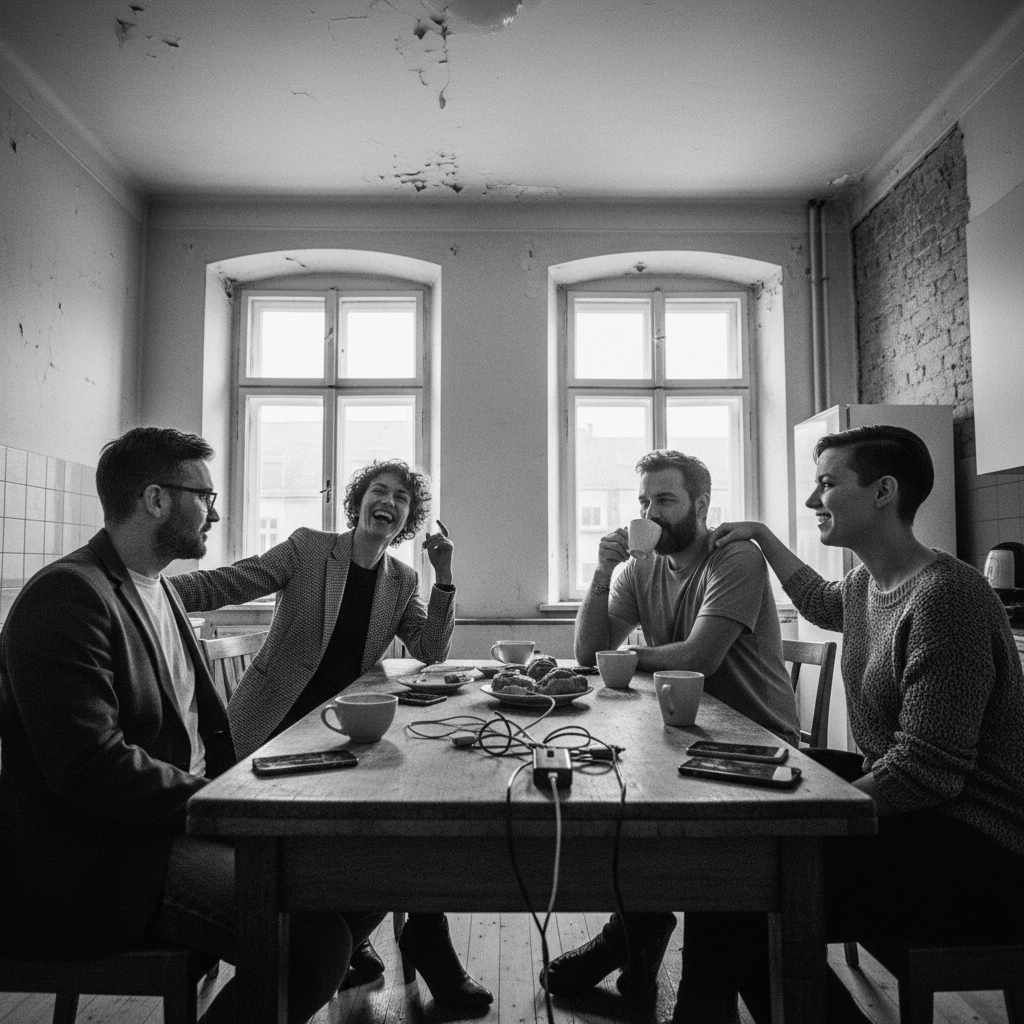Ethical Cheating: What It Is, Who's Doing It, and Why You'll See More
- Nov 3, 2025
- 5 min read
Let's cut through the bullshit: "ethical cheating" sounds like an oxymoron your ex would use to justify that weekend in Prague. But before you roll your eyes and scroll to Instagram, hear me out. What we're really talking about isn't cheating at all: it's a complete reimagining of what fidelity means in 2025.

After three years covering Berlin's underground dating scene and interviewing everyone from polyamory coaches to married swingers, I've learned that ethical cheating isn't about sneaking around. It's about consensual rule-breaking within agreed-upon boundaries. And if you think this is just another trend for bored millennials, you're missing the point entirely.
What Ethical Cheating Actually Is (Spoiler: It's Not What You Think)
Ethical cheating is essentially consensual non-monogamy with a twist: it's when couples deliberately create space for behavior that would traditionally be considered "cheating," but with full knowledge, consent, and often participation from all parties involved.
Think of it as relationship hacking. Instead of pretending that monogamy is natural (spoiler alert: it's not), couples are designing custom relationship frameworks that acknowledge human sexuality's messy reality while maintaining trust and communication.
Here's what it actually looks like in practice:
The Hall Pass System: Couples agree on specific situations where outside sexual encounters are permitted. Maybe it's business trips, certain apps, or particular types of connections. The key is transparency and mutual agreement.
Emotional Affair Licenses: Some couples recognize that deep emotional connections outside the relationship are inevitable: and potentially enriching. They create boundaries around these connections rather than forbidding them entirely.
The Berlin Model: Popular in this city's notorious dating scene, couples maintain separate sexual lives while sharing their primary emotional and domestic partnership. It's like having your cake and eating it too, except everyone knows about the cake.

Who's Actually Doing This? (Hint: It's Not Who You'd Expect)
Last month at a private event in Kreuzberg, I met Sarah, 34, a tax attorney who's been married for eight years. "We tried traditional monogamy," she told me over overpriced wine. "But pretending we didn't find other people attractive was exhausting. Now my husband knows when I'm interested in someone else, and we talk through it together."
Sarah isn't some poly evangelist or free-love hippie. She's a mortgage-paying, dog-walking normal person who got tired of relationship theater. And she's not alone.
The Pragmatic Professionals: These are established couples (usually 30+) who've survived the initial relationship honeymoon phase and decided to be honest about long-term sexual realities. They're not looking to blow up their lives: they're looking to future-proof them.
The Berlin Expat Community: This city's international crowd has created a unique dating ecosystem where ethical cheating is practically the default. When your social circle includes people from 20 different countries with 20 different relationship models, traditional monogamy starts looking arbitrary.
Post-Divorce Daters: People who've been through traditional relationship failures are increasingly interested in custom arrangements. They've learned that following society's relationship script doesn't guarantee happiness.
The Queer Community: LGBTQ+ folks have always been better at questioning relationship norms. Many straight couples are now adopting frameworks that queer communities have been perfecting for decades.
Marcus, a 42-year-old photographer I interviewed, put it perfectly: "We're the generation that customizes everything: our coffee orders, our workout plans, our career paths. Why wouldn't we customize our relationships too?"
The Psychology Behind It (Why Your Brain Wants This Even If You Don't)
Here's the uncomfortable truth: monogamy is hard work. Not impossible, but significantly more difficult than we've been led to believe. Research consistently shows that humans aren't naturally monogamous, yet we've built an entire relationship culture around pretending otherwise.
Ethical cheating acknowledges what psychologists have known for decades: sexual novelty is a fundamental human drive. Rather than fighting this drive or pretending it doesn't exist, couples practicing ethical non-monogamy are finding ways to channel it constructively.
The Forbidden Fruit Effect: When something is completely off-limits, it becomes more desirable. By removing the "forbidden" aspect of attraction to others, couples often find that outside interests become less consuming and more manageable.
Compersion Over Jealousy: This is the practice of finding joy in your partner's pleasure with others. It sounds impossible until you realize that jealousy is often about fear and insecurity rather than love. When those fears are addressed through communication and trust-building, compersion becomes surprisingly natural.
Honest Communication As Foreplay: Couples practicing ethical cheating report that discussing attractions and boundaries actually improves their sex lives together. Taboo conversations are incredibly intimate.

Why This Is About to Go Mainstream (Whether You're Ready or Not)
The numbers don't lie. Dating app data shows that searches for "non-monogamous" relationships have increased 400% since 2020. Polyamory groups in major cities are overflowing. Relationship therapy practices are reporting unprecedented demand for help navigating alternative relationship structures.
Dating App Culture: Apps like Tinder and Bumble have normalized the idea that there are always other options available. This creates a paradox of choice that makes traditional monogamy feel more restrictive than ever. Ethical cheating offers a middle ground between serial monogamy and full polyamory.
Economic Factors: Rising cost of living means more couples are prioritizing practical partnership (shared expenses, child-rearing, domestic stability) while seeking sexual and emotional fulfillment elsewhere. It's relationship economics.
The Transparency Generation: Gen Z and younger millennials have grown up with social media transparency. They're more comfortable with open communication about desires, boundaries, and relationship structures than previous generations.
Berlin's Export Culture: This city's approach to relationships is spreading globally. As more people experience Berlin's casual approach to sexuality and relationships (whether as visitors or through cultural export), traditional monogamy looks increasingly provincial.
Therapy Normalization: As therapy becomes more mainstream, couples are learning communication tools that make alternative relationship structures possible. You can't practice ethical cheating without exceptional communication skills.
The Dark Side Nobody Talks About
Let's be real: ethical cheating isn't a magic solution to relationship problems. It requires more work, not less. More communication, more emotional intelligence, more time management, and significantly more honesty than traditional monogamy.
I've watched couples crash and burn spectacular when they confused ethical cheating with permission to be selfish. The difference between ethical and unethical non-monogamy isn't the behavior: it's the intention and execution.
Time Management Hell: Managing multiple relationships or connection points is exhausting. You need calendar apps, emotional bandwidth management, and the organizational skills of a small business owner.
Social Stigma: Despite growing acceptance, most people practicing ethical cheating still face judgment from family, friends, and society. It's not for people who need external validation.
Emotional Labor Multiplication: Every additional person in your relationship ecosystem multiplies the emotional labor required. Birthdays, feelings, conflicts, scheduling: it all gets more complex.
What This Really Means for Dating Culture
Ethical cheating represents something bigger than just relationship trends: it's part of a broader shift toward customization over convention in all aspects of life. We're moving away from one-size-fits-all solutions toward personalized approaches to everything from careers to health to relationships.
For people entering the dating scene now, understanding ethical cheating isn't about adopting it: it's about recognizing that relationship options exist beyond the traditional binary of single or monogamously coupled. It's about having honest conversations about what you actually want rather than what you think you should want.
Whether you're interested in practicing ethical cheating yourself or just trying to understand what your friends are talking about, the key insight remains the same: the future of relationships is going to be more honest, more customized, and significantly more complicated than what came before.
And honestly? That's probably a good thing.
Want more raw takes on modern dating culture? Check out our other deep dives into Berlin's underground dating scene and CNC psychology.



